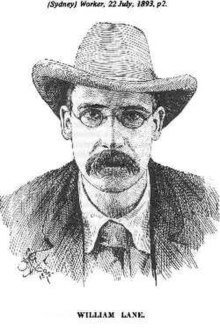William Lane
| William Lane | |
|---|---|
 |
|
| Born |
6 September 1861 Bristol, England |
| Died | 26 August 1917 (aged 55) Auckland, New Zealand |
| Known for | Journalism, political advocacy |
William Lane (6 September 1861 – 26 August 1917) was a radical journalist, advocate of Australian labour politics and a utopian.
Lane was born in Bristol, England, eldest son of Edward Lane, from Ireland a Protestant Master Gardener, and his English wife Caroline, née Hall. When Lane was born his father was earning a miserable wage, but later his circumstances improved and he became an employer. The boy was educated at Bristol Grammar School and showed ability, but he was sent early to work as an office boy. Lane's mother died when he was 14 years of age, and at age 16 he migrated to Canada, then to the United States, where he worked first as a printer, then as a reporter for the Detroit Free Press (1881), there meeting his future wife Ann MacGuire. In 1885 they migrated to Brisbane, Australia, where Lane immediately got work as a feature writer for the weekly newspaper Queensland Figaro, then as a columnist for the newspapers Brisbane Courier and Evening Telegraph, using a number of pseudonyms ("Lucinda Sharpe", which some consider to be the work of Annie Lane, William Wilcher and "Sketcher").
A lifelong abstainer from alcohol, in 1886 he created an Australia-wide sensation by spending a night in the Brisbane lock-up disguised as a drunk, and subsequently reporting the conditions of the cells as "Henry Harris". Lane's father was a drunk who impoverished the family.
With the growth of the 7-2 labour movement, "Sketcher"'s columns, especially his "Labour Notes" in the Evening Telegraph, increasingly promoted labourist philosophy, and Lane himself attended meetings supporting all manner of popular causes, speaking with his "American twang" against repressive laws and practices and Chinese immigrants.
After becoming the de facto editor of the Sydney Morning Herald, Lane departed during November 1887 to found the weekly The Boomerang, "a live newspaper, racy, of the soil", in which pro-worker themes and lurid racism were brought to a fever-pitch by both "Sketcher" and "Lucinda Sharpe". He became a powerful supporter of Emma Miller and Women's suffrage. A strong proponent of Henry George's Single Tax Movement, Lane became increasingly committed to a radically alternative society, and ended his relationship with the Boomerang due to its private ownership.
...
Wikipedia
